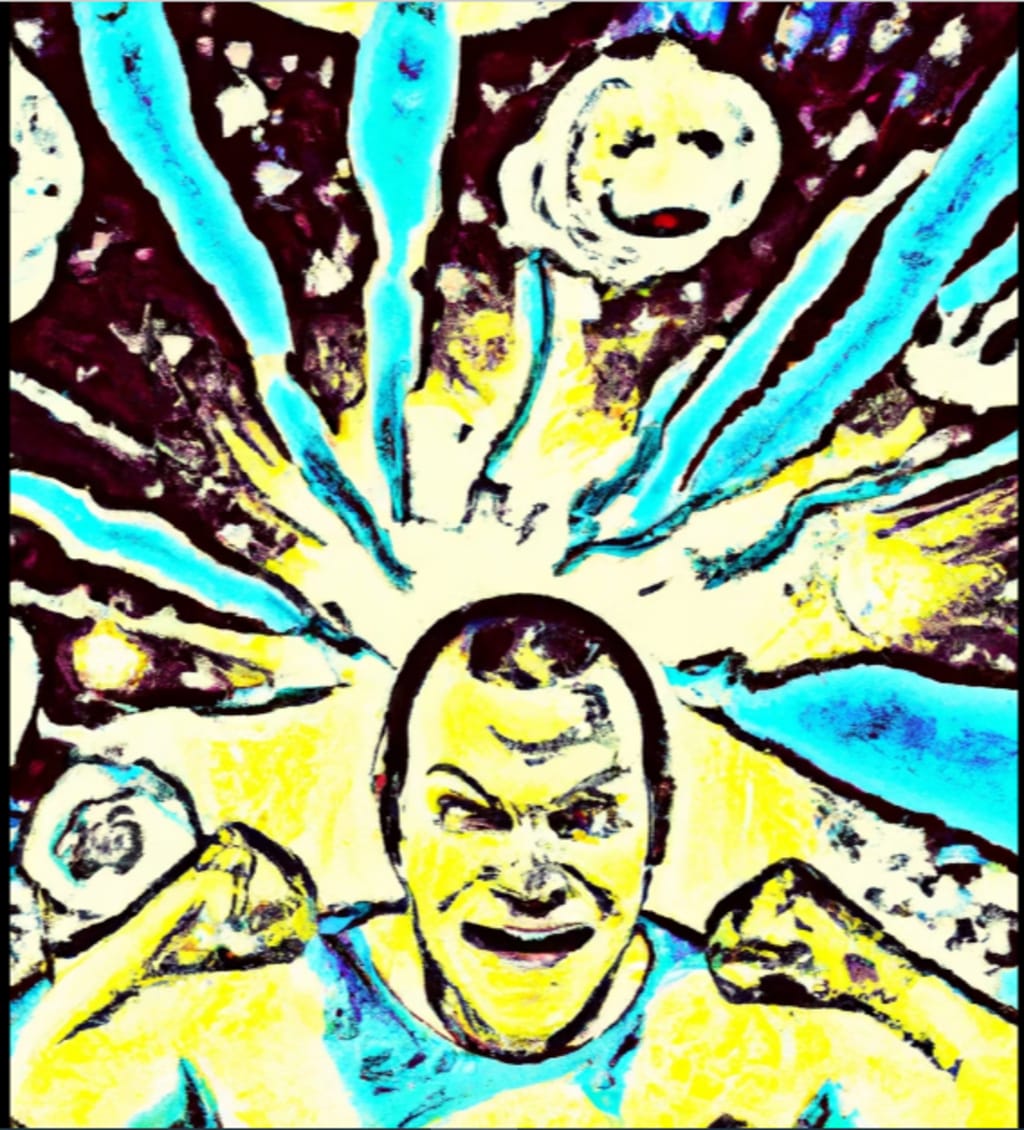Understanding Mania: Types, Symptoms, Impact on Daily Life, and Prevention
Unraveling the Mysteries of Mania: An In-Depth Look at Bipolar Disorder

Mania is a mental health condition characterized by an abnormal and persistent elevated or irritable mood, accompanied by increased energy levels, impulsive behavior, and a reduced need for sleep. It is a serious psychiatric disorder that can significantly impact an individual's daily life, relationships, and overall well-being. We are going to explore the various aspects of mania, including its causes, types, symptoms, prevention, and examples from daily life.
Causes of Mania:
The exact causes of mania are not fully understood, but it is believed to result from a combination of genetic, biochemical, and environmental factors. Some of the possible causes of mania include:
1. Genetic Factors: There is evidence to suggest that genetics play a role in the development of mania. Individuals with a family history of bipolar disorder, a condition characterized by episodes of mania and depression, may be at a higher risk of experiencing mania themselves.
2. Biochemical Factors: Imbalances in certain neurotransmitters, which are chemicals in the brain that regulate mood and behavior, have been implicated in the development of mania. For example, an increase in the levels of dopamine, a neurotransmitter associated with pleasure and reward, has been linked to mania.
3. Environmental Factors: Environmental factors, such as high levels of stress, trauma, or substance abuse, can trigger or exacerbate episodes of mania in susceptible individuals. Changes in sleep patterns, such as a disruption in circadian rhythms, have also been associated with the onset of mania.
Types of Mania:
There are several different types of mania, each with its own distinct features. The most common types of mania include:
1. Bipolar I Disorder: This type of mania is characterized by episodes of mania that last for at least one week and are severe enough to cause significant impairment in daily functioning. Individuals with bipolar I disorder may also experience episodes of depression, which alternate with episodes of mania.
2. Bipolar II Disorder: In this type of mania, individuals experience episodes of hypomania, which are less severe than episodes of mania, lasting for at least four days. Hypomanic episodes may be followed by episodes of depression, but individuals with bipolar II disorder do not experience full-blown episodes of mania.
3. Cyclothymic Disorder: This type of mania is characterized by milder and more frequent episodes of hypomania and depression that persist for at least two years, with periods of normal mood in between. Cyclothymic disorder is considered a milder form of bipolar disorder.
4. Substance-Induced Mania: Manic episodes can also be triggered by substance abuse or medication, such as antidepressants, stimulants, or corticosteroids. Substance-induced mania typically resolves once the underlying cause, such as the substance abuse or medication, is addressed.
Symptoms of Mania:
Mania is typically characterized by a distinct set of symptoms that significantly impact an individual's thoughts, feelings, and behavior. Some of the common symptoms of mania include:
1. Elevated or Irritable Mood: Individuals with mania may experience an abnormally elevated or0 irritable mood that is different from their usual state of mind. They may feel excessively happy, euphoric, or overly optimistic, even in the face of negative circumstances.
2. Increased Energy Levels: Mania is often accompanied by a surge in energy levels, leading to increased activity and restlessness. Individuals may feel a constant need to move or engage in goal-directed activities, such as working, shopping, or engaging in risky behaviors.
3. Racing Thoughts: Manic episodes may be accompanied by a rapid flow of thoughts , where the individual's mind may feel like it's racing or jumping from one idea to another. This can result in a difficulty in concentrating or staying focused.
4. Impulsivity: Individuals experiencing mania may act impulsively without considering the consequences of their actions. This can manifest as impulsive spending, engaging in risky behaviors such as reckless driving or excessive gambling, or making impulsive decisions without thinking them through.
5. Reduced Need for Sleep: Manic episodes can also result in a reduced need for sleep, where individuals may feel like they have boundless energy and don't need to sleep as much as usual. This can lead to insomnia or a decreased need for rest, which can further exacerbate other manic symptoms.
6. Increased Talkativeness: Manic individuals may also exhibit increased talkativeness, where they may talk rapidly and excessively, interrupt others, or engage in pressured speech, where their speech is difficult to interrupt or slow down.
7. Grandiose Ideas or Beliefs: Mania can also lead to inflated self-esteem or grandiose beliefs about one's abilities, talents, or accomplishments. Individuals may feel like they have special powers, are invincible, or have a heightened sense of self-importance.
8. Agitation or Irritability: While mania is often associated with an elevated mood, it can also manifest as irritability, agitation, or even anger. Individuals may become easily agitated, restless, or irritable, leading to conflicts or strained relationships with others.
Prevention of Mania:
As mania is a complex mental health condition with multiple potential causes, it may not always be possible to prevent its onset entirely. However, there are certain measures that can help reduce the risk of mania or manage its symptoms. These include:
1. Medication Management: For individuals diagnosed with bipolar disorder or other related conditions, taking prescribed medications as directed by a healthcare professional can help stabilize mood swings and reduce the risk of mania or depressive episodes.
2. Regular Therapy: Regular therapy, such as cognitive-behavioral therapy (CBT), can help individuals learn coping skills, manage stress, and regulate their emotions, which can contribute to better mood stability and reduce the risk of manic episodes.
3. Lifestyle Modifications: Maintaining a healthy lifestyle, including regular exercise, adequate sleep, a balanced diet, and avoiding or managing stress triggers, can also help manage the symptoms of mania and reduce the risk of its onset.
4. Avoiding Substance Abuse: Substance abuse, including alcohol and recreational drugs, can trigger or exacerbate episodes of mania. Avoiding or limiting the use of such substances can be crucial in preventing manic episodes.
5. Recognizing Early Warning Signs: Learning to recognize the early warning signs of mania, such as changes in mood, energy levels, sleep patterns, or behavior, can help individuals take preventive measures, such as adjusting medication doses or seeking professional help, to manage or prevent the onset of mania.
Examples of Mania in Daily Life:
Mania can manifest in various ways in daily life. Here are some examples of how mania may impact an individual's daily activities:
1. Financial Impulsivity: During a manic episode, individuals may engage in impulsive spending sprees, making extravagant purchases without considering the consequences or their financial limitations. This can result in financial difficulties, debt, or strained relationships with loved ones.
2. Workaholic Behavior: Manic individuals may exhibit excessive energy and motivation, leading to an obsessive focus on work or other projects. They may take on too many tasks, work long hours without rest, and become overly driven to achieve their goals, even to the point of neglecting their health, relationships, or other responsibilities.
3. Risky Behaviors: Manic episodes can lead to impulsive and risky behaviors, such as engaging in reckless driving, engaging in unsafe sexual behaviors, or participating in high-risk activities without considering the potential consequences. For example, a person in a manic episode may impulsively decide to go skydiving or bungee jumping without fully evaluating the risks involved.
4. Rapid Speech: During a manic episode, individuals may exhibit rapid speech, talking excessively and quickly, often interrupting others in conversations. They may jump from topic to topic, making it difficult for others to keep up with their thoughts and ideas.
5. Restlessness and Hyperactivity: Manic individuals may experience restlessness and hyperactivity, feeling like they have boundless energy and an urge to constantly be on the move. They may engage in constant fidgeting, pacing, or other forms of physical agitation.
6. Social Interactions: Mania can also impact an individual's social interactions. They may become overly talkative, dominate conversations, and exhibit impulsive behavior that can disrupt social relationships. Manic individuals may also have difficulty recognizing social cues or boundaries, leading to strained relationships with others.
7. Sleep Disturbances: Reduced need for sleep is a common symptom of mania. Individuals may experience difficulty falling asleep, staying asleep, or feeling the need to sleep much less than usual. This can result in sleep deprivation, which can further exacerbate other symptoms of mania.
8. Decreased Judgment: Manic episodes can impair an individual's judgment and decision-making abilities. They may make impulsive and uninformed decisions, take unnecessary risks, and engage in behaviors that have negative consequences.
9. Emotional Instability: While mania is often associated with elevated mood, individuals may also experience emotional instability during a manic episode. They may exhibit rapid mood swings, going from extreme elation to anger or irritability in a short period of time.
10. Neglect of Self-care: Manic individuals may neglect their basic self-care, such as grooming, eating, and hygiene. They may become too preoccupied with their thoughts, ideas, and activities, leading to neglect of their physical health and well-being.
Conclusion:
Mania is a complex mental health condition characterized by an elevated or irritable mood, increased energy levels, impulsivity, and other related symptoms. It is commonly associated with bipolar disorder, but can also occur in other conditions or as a result of other factors. Mania can significantly impact an individual's daily life, relationships, and overall well-being.
It is essential to recognize the signs and symptoms of mania and seek professional help if you or someone you know is experiencing manic episodes. Early diagnosis and intervention can help manage symptoms, reduce the risk of complications, and improve overall quality of life. Treatment approaches may include medication management, therapy, lifestyle modifications, and other interventions tailored to the individual's needs.
Prevention of mania may not always be possible, but certain measures such as medication adherence, regular therapy, lifestyle modifications, avoiding substance abuse, and recognizing early warning signs can help reduce the risk of manic episodes. If you suspect that you or someone you know may be experiencing mania, it is important to consult a qualified mental health professional for proper assessment, diagnosis, and treatment.
In conclusion, mania is a complex and serious mental health condition that requires proper understanding, recognition, and management. By increasing awareness, seeking timely intervention, and implementing preventive measures, individuals with mania can lead fulfilling and balanced lives.
About the Creator
Shams Ul Qammar
I'm a psyche student who loves raising awareness about mental health. Together we can delve into the world of mental health issues. My responses will be based on my studies. Let's embark on this journey of exploration together!






Comments
There are no comments for this story
Be the first to respond and start the conversation.